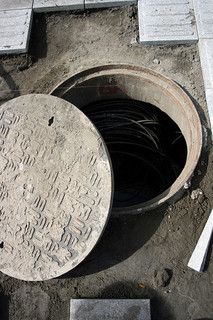
China Daily’s article “Hidden Danger Hazards of Big City Living” is really an infrastructure and construction story. Sinkholes open up and swallow people, sections of glass-walled buildings drop down and kill people, big cities flood. Of course, pretty much the same things happen in Chicago: The loop floods (tho the streets are spared); neighborhoods flood regularly; windows fall from buildings killing pedestrians; sinkholes swallow cars (tho not pedestrians, probably because we have so few pedestrians). Sure, it’s not an everyday occurrence, but China’s urban population is about 250 times Chicago’s, so it’s not surprising that more accidents happen.
The article quotes officials saying that coordination among infrastructure construction and maintenance actors is poor, as is the quality of construction and building inspection. Probably true, and surely in Chicago the inspectors are trustworthy and respected, and infrastructure work is usually well-coordinated.
What really does seem to be a difference is how long infrastructure is expected to last. The China Daily article says 1200 out of 5100 total km of Beijing sewers (possibly referring only to storm sewers) is “at least 30 years old, with some of it dating back six decades. This is typical for most cities, experts say.” One infers that Chinese sewers are expected to last only 30 years. In Chicago by contrast, 1/4 of the water pipes is said to be over 100 years old, apparently the age at which replacement is likely to be justified. Sewers are perhaps even older. And I think this age profile is typical of mature American cities.